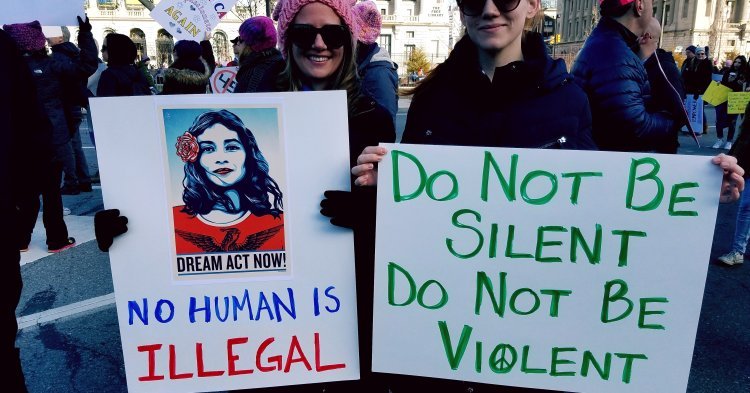When Italian philosopher and politician Gramsci was writing in 1926 about moments of crisis and their “overflowing morbid symptoms”, he couldn’t have foreseen the current situation of public, political, economic and social crisis. However, there is something that we can take from this reflection: if we want to avoid a time of monsters, we need to make the new world come forward. And feminism can help us to do so.
It comes as no surprise that, in a situation of increased uncertainty and inequalities, social anxieties and moral panic find a way to manifest themselves politically. In this context, the politics of fear control public discourse, and our past proves that the product of these narratives falls far from the principles that the European project is set to stand for. Increased discrimination, othering and exclusionary policies; competition, individualism and selfish behaviour. If we want to avoid a wave of distrust, Euroscepticism and far-right politics, we must act. We must act as European federalists. But as federalists, we still have a long collective road to walk, and there is a lot that we can learn from other political movements aimed at building a more inclusive, cooperative and equal society.
In their last book, French sociologists and philosophers Pierre Dardot and Christian Laval argued that building a genuine federalism “is not possible except on the basis of cooperation, not competition” [2]. Recent events prove this point right. The difficulty in finding agreement on a European economic recovery plan and in envisioning a common response to the crisis, as we have seen with the closing of Schengen borders and the failed agreement over coronabonds, seem to be building walls between member states and citizens; the walls that we wanted to dismantle when we advocated for European solidarity as a way to tackle transnational issues.
If there is something that the recent feminist movements have succeeded in, it has been in bringing about the concept of the common through their collective action, building communities that highlight importance of shared public spaces like streets, squares and public welfare systems. This possibility of world-building through cooperation has put the body back at the centre of our political strategies. And the body has become central in this political strategy not only because it allowed feminists to gather in the streets, or because it politicised the violences and risks that women suffer. It has been central because it has allowed us to expose the radical vulnerability and precariousness of our bodies. Here, I do not see vulnerability as a negative condition, one of weakness and abandonment. Instead, I read it as a basic condition of life and social existence, the openness that constitutes us as beings who affect and are affected by others at the same time [1].
It is this openness and fragility that allows us to emphasize the interdependence that organises and conditions our lives. In fact, only through recognising the impact that we have on each other, and the way in which our encounters shape our lives, it is possible to understand the importance of building ties that bring us together.
Feminism has shown us that it is possible to build a polyphonic narrative - a narrative that incorporates multiple (and sometimes contradictory) voices articulated giving place to a wider community. This has only been possible by recognising that we are vulnerable and interdependent, that we need each other, and we cannot operate as independent and self-sufficient individuals. Feminism has thus built a community by exposing our capacity to affect each other, and by taking it as a starting point to build a common project.
This is the right moment to abandon the idea that our participation in a community is conditioned by our belonging to it. In fact, belonging should not be understood as a consequence but as a cause. We participate in a common project, and by doing so, we build the ties and articulate the voices that shape this community in the first place. It is not about taking part in the European project because we are Europeans, but about building a European project by participating in it. And in doing so, building each other as Europeans too.
Europe is not just about monetary policy or border control. Instead, Europe is the act of creating a community that understands each other as equals, as individuals that are interdependent, and that need and affect each other, that are open to a dialogical conversation that articulates the affective, social and political ties into a network, into a common bond. And feminism can teach us how to do this. If we want to avoid the time of the monsters, we must start building this federal community as one of social transformation. We must start building our federal Europe as a community on a basis of interdependence, collaboration and mutual care. And we must do this now.

Follow the comments: |
|
